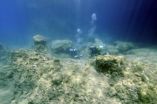(Press-News.org) The magnificent plumage of the peacock may not be quite the sacrifice to love that it appears to be, University of Leeds researchers have discovered.
Dr Graham Askew, from the University's School of Biomedical Sciences, filmed five Indian peacocks taking off using two high-speed video cameras to try to work out what price male birds pay for carrying the spectacular iridescent feathers they use in displays to attract females.
"These feathers weigh about 300g and can exceed 1.5m, so it's expected that the male birds would be making a significant sacrifice in their flight performance for being attractive—possibly giving up their lives if the train restricts escape from predators such as tigers and leopards in their natural environment," Dr Askew said.
He filmed the take-offs of birds carrying full plumage in 3D, and then filmed the same birds taking off without their trains. The display feathers, which naturally moult at the end of the breeding season, were cropped to judge the change in take-off performance between the two states.
To his surprise, Dr Askew found there was no significant difference.
Dr Askew observed the position of each bird's centre of mass, their wing motions and the movement of the train in take-off and then calculated the amount of power used by the birds to accelerate and gain height over the first two wing beats. He found it was essentially the same, regardless of the presence or absence of the train.
"Intuitively you expect that the train would detrimentally affect flight performance and so not finding a detectable effect was a bit surprising," Dr Askew said. "These birds do not seem to be making quite the sacrifices to look attractive we thought they were."
He added: "The train of the peacock is one of the most iconic examples of sexual selection in the animal kingdom. It has been thought that such elaborate ornamentation carries a functional cost for the bearer. These results therefore have broader ramifications for evolutionary biology's understanding of sexual selection."
Dr Askew also looked at how much drag the train created during take-off by mounting a detached train in a wind tunnel. Although the drag doubled, overcoming that drag is only a tiny part of the power used by the birds during take-off. Therefore, the impact of the train on the overall take-off performance is negligible, allowing birds with and without trains to invest the same amount of power in the ascent.
The results do not mean that having an ornate train carries no costs for peacocks. Dr Askew pointed out that the feathers might adversely affect flight stability and the birds' ability to run. Just creating the ornate plumage is a costly exercise; male birds invest about 3% of their daily metabolic energy budget in train growth.
INFORMATION:
Further Information
Dr Graham Askew is available for interview.
The full paper: Graham N. Askew, 'The elaborate plumage in peacocks is not such a drag,' will be published in The Journal of Experimental Biology on September 18 2014 DOI: 10.1242/jeb.107474
URL: http://jeb.biologists.org/content/217/18/3237.abstract
Copies of the paper are available on request to journalists from the University of Leeds press office.
The University of Leeds is one of the largest higher education institutions in the UK and a leading research powerhouse. It is a member of the Russell Group of research-intensive universities. http://www.leeds.ac.uk
Peacock's train is not such a drag
2014-09-18
ELSE PRESS RELEASES FROM THIS DATE:
'Office life' of bacteria may be their weak spot
2014-09-18
Scientists at the University of Leeds think we may be able to drown deadly bacteria in their own paperwork.
A research team in the University's Astbury Centre for Structural Molecular Biology has identified for the first time how the "paper shredder" that keeps the bacteria E. coli on top of its day job works.
Now the group are looking for ways to jam the mechanism and leave E. coli and similar bacteria in filing hell.
Dr Kenneth McDowall, Associate Professor in Molecular Microbiology, who led the research, said: "If we block the 'shredder' using genetics in the ...
Space: The final frontier ... open to the public
2014-09-18
Historically, spaceflight has been reserved for the very healthy. Astronauts are selected for their ability to meet the highest physical and psychological standards to prepare them for any unknown challenges. However, with the advent of commercial spaceflight, average people can now fly for enjoyment. The aerospace medicine community has had very little information about what medical conditions or diseases should be considered particularly risky in the spaceflight environment, as most medical conditions have never been studied for risk in space — until now.
The aerospace ...
Nile River monitoring influences northeast Africa's future
2014-09-18
Curtin University research that monitors the volume of water in the Nile River Basin will help to level the playing field for more than 200 million North-East Africans who rely on the river's water supply.
Despite being arguably the longest river in the world, winding through nine different countries, the Nile River is shallow and has a low volume, making its water precious, particularly to those countries located downstream.
Curtin Associate Professor Joseph Awange, Department of Spatial Sciences, has been monitoring extractions or additions of water to the Nile River, ...
Kids eat better if their parents went to college
2014-09-18
Children of college-educated parents eat more vegetables and drink less sugar, according to a new study from the University of British Columbia. But it's still not enough, the study goes on to say, as all kids are falling short when it comes to eating healthier at school
The research suggests a parent's educational attainment, an indicator of socioeconomic status, may inform a child's diet.
The study found Vancouver school children whose parents completed some post-secondary education were 85 per cent more likely to eat vegetables during the school week than those with ...
Dogs can be pessimists too
2014-09-18
Dogs generally seem to be cheerful, happy-go-lucky characters, so you might expect that most would have an optimistic outlook on life.
In fact some dogs are distinctly more pessimistic than others, research from the University of Sydney shows.
"This research is exciting because it measures positive and negative emotional states in dogs objectively and non-invasively. It offers researchers and dog owners an insight into the outlook of dogs and how that changes," said Dr Melissa Starling, from the Faculty of Veterinary Science. Her PhD research findings are published ...
The viability of premature babies is minimal at 22 weeks' gestation
2014-09-18
A new study analyses the survival rates in Spain of newborns with a gestational age under 26 weeks. The results show that survival under 23 weeks is 'exceptional', although other factors such as birth weight and sex also have an influence.
Experts from the Spanish Society of Neonatology have studied the survival rates in Spain of newborns with a gestational age under 26 weeks, taking into account that a newborn carried to term is between 37 and 42 weeks.
The data have been drawn from the national database that gathers information on all babies born weighing less than ...
A second look at glaucoma surgery
2014-09-18
New research led by Queen's University professor Robert Campbell (Ophthalmology) has revealed using anti-inflammatory medications after glaucoma laser surgery is not helpful or necessary.
Glaucoma is the most common cause of irreversible blindness in the world and about 400,000 Canadians are afflicted with the disease, which is mainly caused by pressure within the eye being high enough to damage the optic nerve. The optic nerve is responsible for sending messages from the eye to the brain and is a vital part of vision.
"The use of strong anti-inflammatory therapies after ...
Tropical fish a threat to Mediterranean Sea ecosystems
2014-09-18
The tropical rabbitfish which have devastated algal forests in the eastern Mediterranean Sea pose a major threat to the entire Mediterranean basin if their distribution continues to expand as the climate warms, a new study warns.
The study, by an international team of researchers led by Dr Adriana Vergés of UNSW Australia and Dr Fiona Tomas of the Mediterranean Institute for Advanced Studies in Spain, is published in the Journal of Ecology.
Members of the team surveyed more than 1000 kilometres of coastline in Turkey and Greece, where two species of rabbitfish have become ...
University of Kentucky research explores STXBP5 gene and its role in blood clotting
2014-09-18
LEXINGTON, Ky (Sept. 17, 2014) -- Two independent groups of researchers led by Sidney (Wally) Whiteheart, PhD, of the University of Kentucky, and Charles Lowenstein, MD, of the University of Rochester, have published important studies exploring the role that a gene called STXBP5 plays in the development of cardiovascular disease.
According to Whiteheart, previous genome-wide association studies (GWAS) identified a gene called STXBP5 as a factor that regulates a protein called Von Willebrand factor (VWF).
VWF is an important contributor to normal blood clotting. When ...
UT Dallas study uncovers factors in students' reporting of weapons at school
2014-09-18
As a result of outbreaks of violence in the nation's schools, concerns have grown about school safety and the overall well-being of students.
In a new study, UT Dallas criminology researchers have found that certain factors affect students' willingness to report weapons at school.
"A big part of adolescent development is figuring out your identity, and that does not always mean talking to grown-ups about what is going on," said Dr. Nadine Connell, assistant professor of criminology in the School of Economic, Political and Policy Sciences. "We can't stop students from ...


